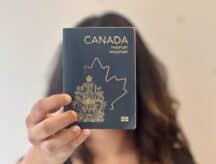How your spouse or partner may be able to join you in Canada sooner than expected
Although the term “family reunification” encompasses many groups (spouses, common-law partners, children, parents etc.), a big part of Canada’s family-class immigration is focused on the sponsorship of spouses and partners by Canadian citizens and permanent residents (PRs).
In fact, family-class pathways are Canada’s second most popular method of immigrating after economic immigration.
This is solidified by statistics published within the 2023 Annual Report to Parliament on Immigration by Immigration, Refugees and Citizenship Canada (IRCC). According to statistics from this report, save for a drop that can be attributed to COVID-19 in 2020, the number of sponsored spouses and partners (as well as children) who were admitted to Canada has gone up steadily from 2018 (67,140) to 2022 (70,076).
On the other hand, according to the 2023 Annual Report, the processing time for these sponsorships has also increased, rising from 13 months in 2019 to 18 months in 2022.
Sponsor your family for Canadian immigration
IRCC aims to process 80% of applications across all lines of business within service standards. Service standards are the amount of time that the department has judged to be reasonable to decide on an application. Service standards vary depending on the type of application. For example, at the time of writing, Express Entry applications have a service standard of six months while family class sponsorship applications for permanent residence can take up to 12 months.
This is a long time for Canadian citizens/PRs to wait to be reunited with their families, leading many to look for faster options to bring their spouse or partner to Canada. Fortunately, IRCC gives applicants two options that may help them bring their spouse or partner to Canada sooner than expected.
Option 1: Open Work Permits
To be eligible for a Spousal Open Work Permit (SOWP), spouses, common-law partners and conjugal partners who are being sponsored for permanent residence in Canada must meet the following criteria:
- Be able to prove a genuine relationship with their sponsor
- Be included in an application for permanent residence, and have an Acknowledgement of Receipt (AOR) letter confirming that their permanent residence application is being processed
- Be living in Canada with their sponsor
Processing Time: IRCC currently has a service standard of 60 days to issue final decisions for all new work permit applications.
In addition to following the main steps to apply for a work permit, there are extra steps to this process that vary depending on an applicant’s specific situation.
This dedicated webpage includes more details about the OWP application process.
Option 2: Visitor Visa
In general, eligibility for a Visitor Visa – also referred to as a Temporary Resident Visa (TRV) – first requires the applicant to meet the following general requirements:
- Have a valid travel document, like a passport
- Be in good health
- Have no criminal or immigration-related convictions
- Convince an immigration officer that you have ties—such as a job, home, financial assets or family—that will take you back to your home country and that you will leave Canada at the end of your visit
- Have enough money for your stay (the amount needed to satisfy this requirement will change depending on how long the applicant will stay in Canada and whether they will stay in a hotel or with friends/relatives)
Processing Time: At the time of writing, IRCC has a service standard of 14 days for processing new visitor visa applications submitted outside Canada.
Some applicants may also need a medical exam and/or a letter of invitation from a Canadian resident.
For those looking to “visit a “spouse or partner who has sponsored [them] for permanent residence”, IRCC indicates that applicants may also need a combination of the following documents to support their application:
- A Proof of Relationship Document: To be submitted with the visa application, this document proves the applicant’s relationship with the person or family member inviting them to Canada. Acceptable documents may include a marriage certificate or a Statutory Declaration of Common-Law Union (IMM5409)
- An Identity Document: To be submitted with the visa application, valid passports or travel documents can be used to prove your identity (whichever document will be used to travel to Canada)
- A Family Information Document: To be submitted with the visa application, this form must be completed by every visa applicant who is 18 years of age or older.
- The Use of a Representative Form, if applicable: To be submitted with the visa application, this form must be completed any time a family member or third party applies on behalf of the principal applicant
According to IRCC, not all the documents above or those listed on its visitor visa webpage are required, some are optional. IRCC also notes that the submission of all listed documents does not guarantee approval of an application.
Spouses/partners who are approved for a visitor visa may apply for an open work permit (OWP) when they arrive in Canada. This means that, all told, a sponsored spouse or partner could potentially arrive and become eligible to work in Canada within approximately three months of first applying for a visitor visa. However, it is important to note that IRCC does not always meet service standards and it could take longer than anticipated.
Key things to know about pursuing either an OWP or a Visitor Visa
Both of the above options can only be pursued for spouses/partners of Canadian citizens/PRs after a permanent residence application has been submitted for spousal sponsorship. Applicants must also have received an AOR, which confirms the application is in progress, before pursuing either of the above options.
Only at this time may the applicant possibly benefit from faster processing for a visitor visa.
Note: According to IRCC, spousal sponsorship applicants who are deemed eligible for a visitor visa after receiving their AOR will automatically receive faster processing on their application.
Canada’s commitment to family reunification
In May 2023, IRCC announced several new measures focused on strengthening family-class immigration and family reunification efforts across Canada.
In addition to the faster processing described above, these measures also included new and dedicated processing tools for spousal TRV/visitor visa applicants and a temporary public policy* that allowed for OWP extensions for certain eligible open work permit holders.
*This policy expired at the end of 2023.
Read more about Canada’s commitment to family reunification here.
- Do you need Canadian immigration assistance? Contact the Contact Cohen Immigration Law firm by completing our form
- Send us your feedback or your non-legal assistance questions by emailing us at media@canadavisa.com







